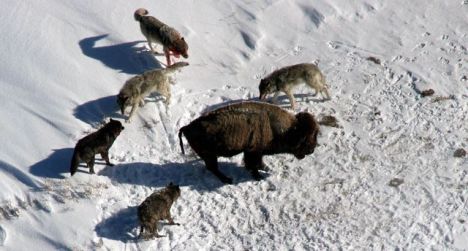by Bob Berwyn
Bipartisan letter from House members supports push to reclassify entire gray wolf population as threatened
Staff ReportFRISCO — A proposal to restructure the lawsuit-plagued recovery efforts for gray wolves may be gaining political traction, as 79 members of the U.S. House recently signed on to a letter supporting the plan to reclassify all wolves in the U.S. as “threatened” under the Endangered Species Act.
Conservation advocates see their request as a reasonable alternative to taking wolves completely off the endangered species list. A “threatened” status would enable the U.S. Fish and Wildlife Service to continue restoration efforts where needed, while giving states more flexibility in managing the predators.
The support in the House for downlisting comes after a federal court’s recent decision to reject the Service’s proposal to end federal protections for gray wolves in the Great Lakes region and Wyoming.
“A nationwide threatened designation would allow for the development of a national recovery plan to return wolves to places like the southern Rocky Mountains, the Sierra Nevada and Adirondacks,” said Brett Hartl, endangered species policy director at the Center for Biological Diversity.
“Downlisting is a good alternative to an attempt by some in Congress to do an end-run around the Endangered Species Act to end protection for wolves in the Great Lakes region, a move that would hurt wolf recovery and undermine the integrity of the law for all listed species.”
The letter points out that wolves have only been restored to 5 percent of their historic range, and that a “threatened” designation is now more appropriate. The letter notes that if wolves were listed as “threatened” nationwide it would allow for more flexible management to address wolf conflict in areas like the Great Lakes where wolves are present, but still allow for wolves to recover elsewhere where there is suitable habitat.
An excerpt from the letter, signed by 78 lawmakers from both parties:
“Scientific experts have shown, and courts have confirmed, that
the best available science does not justify the removal of all ESA
protections for gray wolves at this time. By continuing to assert
otherwise, the Service is overshadowing the good work it did in the
1990s to reintroduce and begin recovering gray wolves in the northern
Rocky Mountains. Once on the cusp of writing one of the great
conservation success stories of our time, the Service has reversed
course and has not considered alternatives that meet the requirements of
the ESA while also giving states more flexibility to manage conflicts
between wolves and livestock. This approach has created uncertainty for
states and stakeholders, hindered species’ recovery, and led some to
believe that Congressional action to delist gray wolves is the only
viable solution.”
The Fish and Wildlife Service’s previous piecemeal efforts to take away protections from gray wolves in the northern Rockies and western Great Lakes have been discredited by leading conservation scientists and repeatedly rejected by multiple federal courts.
source



No comments:
Post a Comment